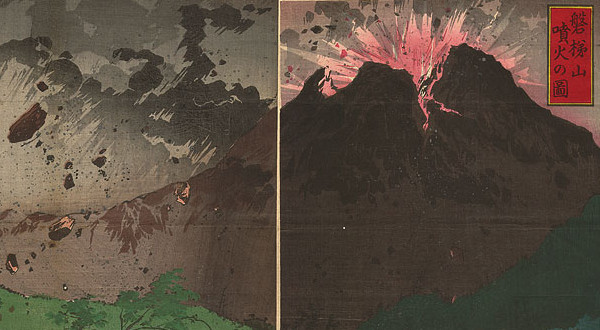The Internet tells me that it’s been nearly two months since I last updated, which means I’ve broken my promise of weekly updates nearly eight times now. First the excuses: thesis, issues at school, issues on the homefront, Mardi Gras. That’s all you’ll hear of them. For the next 6-8 hours, I’ll be doing nothing but reading and noting thoughts here, hopefully every 5-10 pages or so. When I read at pace, I can read 10 pages an hour, but I doubt I’ll be able to keep that up all day. We’ll see how far I get.
First, a quick update on where we are. Just finished pages 65-75, which means I’ve completed Chapter 4. Boku and the librarian have had their initial conversation and encounter. Birnbaum makes a few alterations, which is to be expected, but the one noticeable change is that he cuts the coffee from the scene. In the Japanese, she serves coffee as they talk, and in English they just talk. This seems like an odd cut, especially since it mirrors the coffee in the Hard-boiled Wonderland sections that Watashi drinks with the old man. Perhaps Birnbaum makes the cut so as not to give away the book’s conceit? Would that show that the two worlds are connected more than the paperclips already suggest? At any rate, it doesn’t change the text all that much.
Chapter 5 starts with Watashi laundering the data and the old man gone to un-mute the granddaughter. Only a few sentences cut here: one about the way the scientist eats sandwiches, one line of dialogue from the old man about how he tried calling the granddaughter on the phone to no avail, and the last about Watashi’s reaction to the possibility of a silent conversation with the old man.
And so I start on 76…
12:31: A nice translation by Birnbaum. 生きることは決して容易なことではないけれど、それは私が私自身でやりくりしていることなのだ。(77) In translation, “Life’s no piece of cake, mind you, but the recipe’s my own to fool with.” (51)
A couple of cuts in this area, mostly to decrease repetition on Murakami’s part. Also, one mention of the movie Warlock and Peter Fonda cut. I think I saw Pynchon mention this film somewhere. Anyone seen it? What’s the deal with Warlock?
13:07: Cool compound: 筆談 (ひつだん) – communicate in writing.
13:53: Finished 76-86 in just over an hour, I think, so I’m on pace. Some minor adjustment, and two major changes in this section, which is the end of the laundering and Watashi’s second encounter with the granddaughter.
The first section that’s a little altered is rendered like this by Birnbaum:
It’s been less than ten years since the whole Calcutec profession began, so nobody really knows what that life expectancy ought to be. Some say ten years, others twenty; either way you keep at it until the day you die. Did I really want to know how long? If it’s only a matter of time before you burn yourself out, all I can do is keep my muscles loose and my fingers crossed.
The Japanese is:
計算士という制度は生まれてからまだ十年に充たないので、その職業的寿命がどの程度のものなのかは誰にもわからない。十年と言うものもいるし、二十年と言うものもいる。死ぬまでできると主張するものもいる。早晩廃人になるという説もある。しかしそれはぜんぶ推測にすぎない。私にできるのは二十六個の筋肉をきちんとほぐしておくことだけだ。推測は推測に適した人間にまかせておけばいいのだ。(78)
And a more literal version is:
Less than ten years have passed since the start of the Calcutec system, so no one knows the life expectancy of the profession. Some say ten years, some say twenty. Some brag that they can do it until they die. There’ve also been rumors that sooner or later you burn out. But all of them are nothing more than guesses. All I could do was perform all twenty-six stretches. I’ll let everyone else keep guessing.
Not sure about that last sentence, but you get the point. Birnbaum’s version paints a pretty bleak picture for the Calcutec profession. Murakami’s Japanese suggestions a Calcutec that is not as resigned as in the translation.
14:03: Birnbaum also alters the conversation with the granddaughter to make it a little funnier. On the way to the elevator, she keeps asking questions about the life of a Calcutec, including about sexual practices:
“Grandfather says the first man I sleep with should be over thirty. He also says if sex drive builds up to a particular point, it affects your mental stability.”
“Yes, I heard this from your grandfather.”
“Do you think it’s true?”
“I’m afraid I’m not a biologist.”
“Are you well endowed?”
“I beg your pardon?” I nearly choked.
“Well, it’s just that I don’t know anything about my own sex drive yet,” she explained. “So I’d like to try lots of different things.”
In Japanese, this reads:
「祖父は最初に寝る男は三十五以上がいちばんいいって言ってるの。性欲が一定量以上にたまると頭脳の明晰さが損なわれるんですって」
「その話は君のおじいさんから聞いたよ」
「ほんとうなのかしら?」
「僕は生物学者じゃないからよくわからない」と私は言った。「それに性欲の量は人によってずいぶん違うからそんなに簡単に断言できないと思うね」
「あなたは多い方かしら?」
「まあ普通じゃないかな」と私は少し考えてから答えた。
「私には自分の性欲のことがまだよくわからないの」とその太った娘は言った。「だからいろいろとたしかめてみたいのよ」
As you can see, a pretty radical change. Simplified:
“My grandfather says the first man I sleep with should be over thirty-five. He says that if your libido builds up past a certain point, you lose mental clarity.”
“So I heard from your grandfather.”
“Do you think it’s true?”
“I’m not a biologist, so I’m not sure,” I said. “And libido differs drastically by person, so I can’t really say.”
“Do you have a strong libido?”
“Normal, I guess,” I said after some thought.
“I don’t know my libido yet,” the pudgy girl said. “So I want to try all sorts of things.”
Birnbaum replaces “libido” with a penis joke, basically, making it an easier laugh, but he also cuts the “I said after some thought,” in Watashi’s reaction, making him seem more surprised than he is in Japanese. He’s surprisingly cool headed. He cuts another line earlier in the passage, right after when she asks if he’s gay, where Watashi explains that he doesn’t “blab about his personal life” but neither is he hiding anything, so he answers honestly. Questionable changes here.
14:59: Slight cut in the beginning of Chapter 6 when Boku is learning to read dreams. Boku is frustrated that there is no meaning/point to reading the dreams – he just reads them and that’s it – but in the end he relents and in the translation says, “Please show me” (59). The Japanese is a little different. Here he says 「読むことにするのよ…いずれにせよ、そうする以外に僕には選びようもなさそうだからね」: “I’ll read them. … Because it doesn’t seem like I have any choice.” He’s making much more of a decision than in the translation. That said, Birnbaum does give the translation a pleasant sparseness, which is built with a couple other small cuts as well.
15:26: Just read the phrase そのうちに慣れる and remembered how long it took me to get used to the idea of そのうち meaning “soon enough” or “before long.” I think this was because I was always equating その with “that” and wondering what it was referring to.
15:32: Birnbaum chooses “Drinking in” as the translation for 光を目が吸いこんで. Maybe a little awkward. “Taking in”?
15:42: Note to self: Write something about using んだ as a command. For example, じっとしているんだ: Hold still.
16:08: Strange that I picked the そのうちに慣れる to comment on. It gets repeated in the chapter. First the librarian says it to Boku about reading dreams – he’ll pick it up eventually. Then, at the end of the chapter, Boku compliments the librarian’s hair. She’s not sure what to make of it and says that she’s not used to the way he talks. Boku borrows her phrase from earlier and says that she’ll get used to it soon enough. Birnbaum cuts this final line before a space break on page 64 of the translation and ends instead with the librarian’s final line: “I suppose I am unused to your way of speaking.”
16:25: Just finished Chapter 6, so I’ve completed up to page 97. Most of the cuts in 6 were to get things moving more quickly and provide compression. The only major loss is the そのうち慣れる which I mentioned above. Would’ve been nice to keep that in place. Moving on after I make more tea.
17:06: 何がどうなろうと知るものか。Do you really expect me to know what’s going on?
17:58: I’ve gotten a little sidetracked. Just going to read a few more pages. The most dated part of this book is that Watashi puts the unicorn skull on top of his TV – he has no mantle, nowhere else to put it. This confused even me for a brief moment until I realized that TVs used to be huge.
18:19: Cool Word: 生まれつきの – a born something or other. In this case, a “born shopper.”
18:28: Watashi does some drinking and driving. After shopping in this chapter, he pulls into a family restaurant and has a beer with lunch. He had a beer earlier in the day as well. Anyone know when the zero tolerance laws went into effect? They are pretty intense about them, so I’m surprised to read this here.
Not many changes or cuts here, but I can give one last example of a typical move that Birnbaum makes. Watashi has a small Japanese car he uses exclusively for his shopping trips. When he recounts the time he bought it, the salesman tells him that people who want complicated cars are crazy – small and simple is how cars were meant to be. In Japanese Watashi responds simply: 私もそう思う、と私は言った; I told him that I thought so as well. But Birnbaum uses this opportunity to do character work in the narration: “No argument from me” (72). It’s not much of a change, or is it? It reminds me a little of how Birnbaum translated the end of “Lederhosen.”
Whew. Done for the day. 30 pages in about six hours with breaks to blog, bathroom, and make tea. If I do this a couple of times, I’ll be back on schedule.




